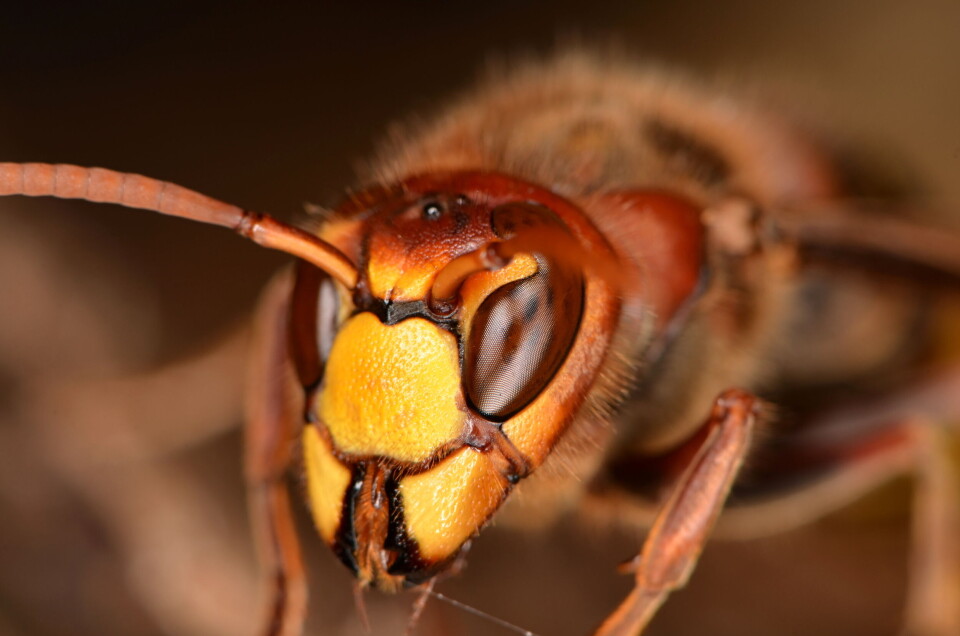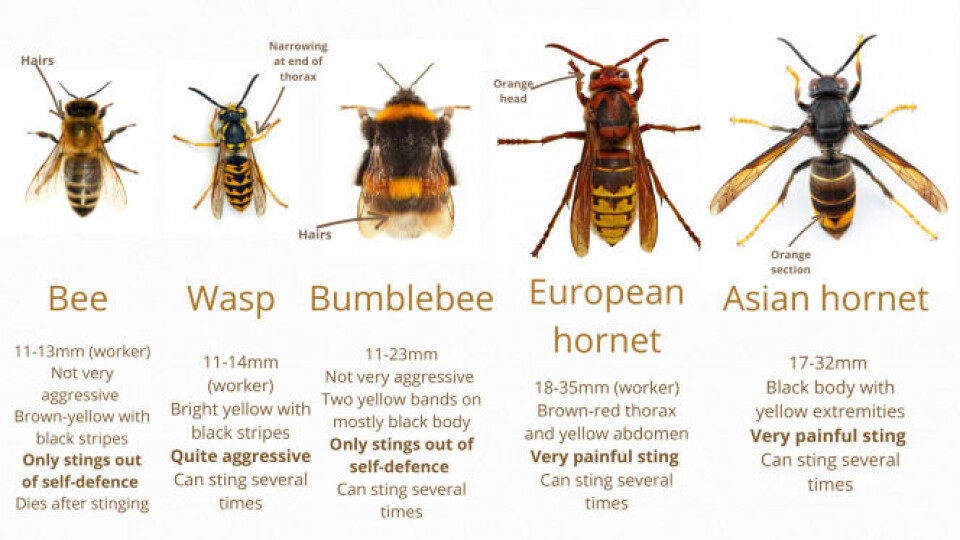-
How to fit in when you move to France: avoid that ‘expat bubble’
After two decades in central Brittany, Jill Fitzgerald O’Connor wants to help other movers feel part of their new community
-
Rugby vocabulary to know if watching the Six Nations in France
From un tampon to une cathédrale, understand the meaning of key French rugby terms
-
How to save money on fashion and clothes in France
Growing number of second-hand shops are selling clothes by weight
French hornet attack: how to spot the insects and treat the stings
After two cyclists were taken to intensive care having sustained up to 50 hornet stings each this weekend, we look at signs to watch out for

Following the hornet attack on a group of cyclists in Loire this weekend which left two men in intensive care with dozens of stings, we look at how to spot the insects and what to do if stung.
Read more: Two cyclists in France stung 50 times each in hornet attack
Since the attack on Sunday (August 21), both have been released from intensive care.
One of them, Jacky Belot, has said that his backpack and helmet saved him from being stung even more than the 30 times he was, adding: “I fell from my bike, and by survival instinct I quickly got back up to cycle out of the wood.
“I collapsed there on the path, I don’t really know any more.” He fell into a coma, but was eventually able to go home on Monday evening (August 22).
He said that the other cyclist who was admitted to intensive care suffered 53 stings, but “reacted better than me”.
“Hornet stings are frequent but this type [of attack] is very rare and very surprising, Lieutenant Rémi Perret of Loire’s fire and rescue service told BFMTV.
“To explain what happened is a little difficult,” he said, adding that the swarm of insects was within a dead tree stump situated two metres from the path being used by the cyclists.
Three ambulances, a fire and rescue crew, a doctor and an emergency response team were sent to the scene after the attack, and the hornet nest was destroyed.
Read more: ‘The hornet attack on cyclists in central France was not random’
How do I spot a hornet?

France is home to both European and Asian hornets, and this weekend’s attack was carried out by a swarm of the former.
European hornets can be distinguished firstly by their size. While worker wasps typically measure between 11 and 14mm, worker European hornets are 18-35mm, which is also significantly larger than a bumblebee.
Wasps have a clear yellow and black pattern, but these hornets have a more browny-coloured thorax, which makes their yellow stripes appear duller.
European hornets also have a red mark on their back in the shape of a ‘V’. They can be found in hedgerows, tree stumps, attics and sometimes shutters.
In contrast, Asian hornets, which are also larger, measuring between 17 and 32mm, have a black body and only a little yellow on their extremities.
They also have an orange-coloured band across the bottom of their abdomen.
Asian hornets often nest underground.
How do I avoid being stung?
Christophe Prudhomme of the Association des médecins urgentistes has said that if you notice that your home or holiday rental has a lot of hornets flying around it, you could carefully search for the nest.
This may be situated in the roof, between a shutter and the window or in an outbuilding.
Once you spot it, do not approach it, but rather get in touch with a pest control specialist. Fire and rescue services will not come out to destroy a hornet nest.
Hornets may also approach you while you are eating outside, but there are several products that can help to deter them. These include balms or sprays containing citronella or eucalyptus, which you can normally buy in a pharmacy.
If you do not have wasp or hornet repellent and a hornet does fly up to your table, do not chase it away, but rather calmly walk away.
Hornets should only sting if they feel threatened by something, so making slow, smooth movements away from the insect should help to prevent an attack.
What happens if I am stung?
Although hornets are significantly bigger than wasps, their sting is not necessarily more dangerous.
It will penetrate more deeply into the skin, so will normally feel more painful, but the after effects should be limited to redness, swelling and tenderness.
However, people who are allergic to wasps or hornets must carry a dose of adrenaline on them in case they are stung.
They must also inform their close circle about their allergy so that they can find and use the adrenaline if needs be.
Even if you are not allergic to wasps or hornets, it can be dangerous to be stung around your mouth or throat. In this case you should call the emergency services on 15 or 18, as the swelling could cause you to choke.
Read more: French emergency services: Why it is now harder to reach 15 number
What should I do if I am stung elsewhere on my body?
If you are not allergic to wasps or hornets and you are not stung around your mouth or throat, the sting should clear up without medical intervention.
The first thing you should do is to remove yourself from the area, so as not to further provoke the hornet(s) and cause further stings. Hornets can smell humans from quite a distance, so you may need to move fairly far away.
If you are near a pond or lake, submerging yourself can help to throw the insects off your scent.
Then you should remove the sting carefully using a tweezer, taking care not to damage the venom sac, and clean the area with an antiseptic.
Calming creams are available in pharmacies to soothe the pain, but full recovery can take up to a few days.
Dr Prudhomme said that it may be necessary to “reassure” children, “as the swelling can be quite impressive”.
The more stings you have, the more attentive you should be to how you are feeling, as anything more than 20 in an adult or five in a child is dangerous. In this case, it is best to call the Samu, as the venom can provoke fevers or even convulsions.
Related articles
France to take action against Asian hornets and other invasive insects
‘Sex traps’ can control Asian hornets, new French-Chinese study shows
























